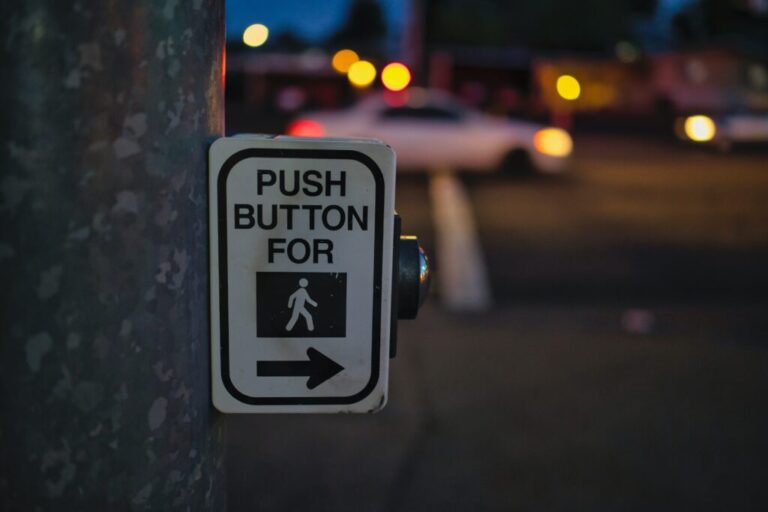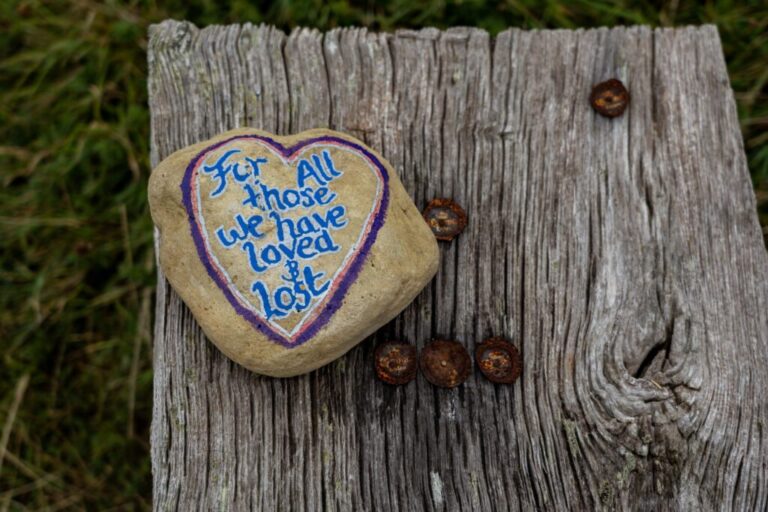Grief is one of those tricky emotions that can take us off-guard at any moment. The simplest gesture can trigger a memory and quickly fold itself into our grief. The only remedy is time, and time sure does take it’s sweet time to dull the edges of grief. The only way out is through.
I once had grief explained to me as a button in a box, with a ball. The box is small, the ball is large and fills up most of the space. There is a button on the wall and whenever the ball bumps into it, you feel the same deep grief you did in the beginning. And because the box is small, the ball bumps into the button a lot, at first.

But as time goes on, the box grows, and the ball, while still the same size and rattling around, it has more space to move in and it bumps the button less often. Hitting the button of grief, it can still feel as raw as it did in the very start, but because it comes less frequently, it gets dulled by time. And the box grows — the more experiences you have, the more joys you fill that box with, the bigger it gets. Soon, the ball is hitting that button less and less frequently until it’s almost never at all. A random sighting of someone with the same hair, or smile, or laugh, can make that ball zoom right for the button, and you’ll catch your breath at how agonizing that grief bubbles up — but you’ll also know, because you’ve experienced this many times since the first grief, this too shall pass.
I really like that analogy of how grief interacts with our lives. When you lose someone, that grief never really goes away and it doesn’t ever really get smaller — but our lives do get bigger, and we do grow beyond the grief.
According to Elizabeth Kubler-Ross (1969) the 5 stages of grief can come in any order and repeat themselves or be skipped as needed.
Denial – it can look like avoidance and feel like numbness.
This stage is when we completely disbelieve the information we’ve been given. It must not be true, it simply can not be true, it does not make any sense and does not jive with any thoughts or plans for the future. In fact, I think, for me, the hardest part to lose is the future plans.
When my fiancé passed nearly 8 years ago I was devastated at the loss. I’d never see him again, hear his voice or touch him. I lived too far away, and was too poor to travel to his funeral in Georgia to say goodbye. Even writing these words now allows that ball to hit the button over and over again. Matthew is gone. I eventually accepted that piece of news. But letting go of our plans, of our Pi wedding day (03.14.15) and our future together… that was almost harder than the idea of him not being there. Now everything we’d dreamed of together would never come to be. The numbness around that part lasted quite a long time.
Anger – it can look like cynicism and can feel like rage.
This stage, like all the others, will be unique to the one who goes through it. Anger can be debilitating but it can also be motivating. One of the best pieces of writing I’ve ever made came from the anger of being blown-off for a date on my birthday. I channeled that emotion down into the page and came away with a wonderful spoken word piece. But anger can also be destructive and (within reason) that’s okay. I remember my mom, when my dad left, taking his blue drinking bottles into the backyard and throwing them as hard as she could until they all smashed. She wasn’t hurting anyone, she just didn’t know what to do with the big emotions inside her, and her anger gave her an outlet to purge. This is a tricky sort of reaction — there are rooms you can pay to visit, where they allow you to smash everything in sight. The science is still out as to whether they actually help or hinder with anger. One other tool I’ve found helpful, take a large salad bowl, place a throw pillow over the top of it, and scream into the pillow. The bowl helps contain the sound. You can scream as loud and as long as you need, without worrying the neighbours will come check in on you!
Bargaining – it can look like pessimism and can feel like shame.
This stage can be long. If-only’s come into play here. If only I’d taken that last call, if only we hadn’t fought, if only I could take his place. We’re willing and ready to do anything it takes to make it not true. Whatever the grief may be, the loss of a loved one, or the loss of a home, or a limb, or — there are so very many tragic events that can lead to grief. Wanting to trade something to make it not true and feeling like if you’d just been a better person, a better partner, more mindful, whatever it would have taken, you would do it now, can’t they see?
Matthew called me the day before he passed. I had just been down to visit him over the holidays, and I’d only been back a short while. I saw his call come in, but I was playing a board game with my son and I knew Matthew and I had our whole lives to spend together, I could take his next call instead. Only, there never was another call. I missed the last call. Would I have been able to detect that something was wrong, before he went to bed that night, and encourage him to have gone to a hospital? I don’t know. I’ve played that scenario over in my head from a million different angles, but what happened was, I didn’t take his call and I’ll never know.
Depression – it can look like crying and feel like despair.
This stage can take you by surprise and knock you right out of alignment with your whole life. It can be dark, scary, and lonely. It can feel like the bottom has dropped out and you’ve reached rock bottom.
I spent two years here. Two very long years of depression. I have many regrets about those years, especially around raising my son and being distant — I think it allowed him to become self-sufficient at a time when he was fully capable (age 11 and 12), but I don’t think we talked enough during those years for him to really understand what was happening to me. I also developed a near-narcolepsy condition (medicated and under control now) that had me sleeping more hours than I’d care to remember. My son is almost 19 now and we’ve come to terms, together, with that time in our lives. But grief is a powerful emotion, often robbing us of time while we go through it.
Acceptance – it can look like adapting and can feel like courage.
This stage takes so much strength. Like building a wall behind the flood of tears, damming the flow and only letting it out in metered amounts. Accepting a loss is a big step in the right direction. Maybe it was something smaller than a lost love one — maybe you didn’t win the tournament in sports against your rivals. This is still loss, and can be followed by grief (in all it’s stages). Acceptance can sometimes be the route to planning for the next win! What didn’t go right this time, what will I do differently next time?
Acceptance for me took about the same 2 years as depression. Finding the world again, realizing that there were still things I wanted to do with my life, that there were many people who loved me and wanted the best for me. Knowing that my plans were changed for good was hard, but having new plans helped.


When we are grieving, it can feel like nothing else in the world is real, like time has stopped and we are powerless to move beyond this moment, or even like we are wrong to want to go on in the face of the loss. Here are some suggestions of ways and activities that can help you move forward when you are grieving:
Give yourself space to grieve — if that looks like setting aside just 15 minutes of your day, to sit in a quiet place and feel your feels, then that’s what it is. If it is a long run, or bike ride, listening to your favourite songs, or maybe it is filling a canvas with all your favourite colours, whatever it might be, give yourself that space to feel.
Keeping them alive — while there is no magic potion or spell that will bring back a loved one, we are still full of cherished memories of them. Writing these down in a journal can help, you can phrase it as though you are writing to your loved one. Or maybe someone who also knew and loved them would like to start a letter exchange with you, where you share your best memories of the lost one. Use whatever you need, whether it’s through photograph slide shows, or video compilations. Keeping your loved one alive for as long or as short as you need this, can be a really lovely way to finally say the goodbyes you never got.
Distract — no one is going to tell you, when you are grieving, that binge-watching your favourite show is a bad idea. Get in your favourite jammies, pull a loved pet in for a snuggle on the couch, and watch the reruns of every show that makes you laugh or cry, whichever you need most right now. There are, of course, many other ways to distract, some less healthy than others. But you do you, what you need in this moment will be personal. Read a book, have a hot shower, whatever it is, keep yourself from thinking the things that make you cry.
Take them with you — I know this, like keeping them alive, is really just a trick of words. There’s no way to bring this person with you for all of life’s ups and downs. However, when you go through those major life moments, like a graduation or a wedding, or a first car or first house or first baby … having this lost one with you in some form might be just what the doctor ordered. Maybe you go to their favourite restaurant, or maybe you keep a scrapbook just for you to share with their memory. Maybe you wear jewellery you’ve had made with a bit of their ashes, so they really are with you all the time. There are many ways to take care of those memories.
The next generation — I have photographs of some of the most influential and important people in my life who are now gone. I share them with my son, and with my friends. I tell stories about the times we were together. This is another way to keep them with us, by sharing their jokes and stories. As a kid, I thought “Save your money and buy a bus.” was just another idiom that everyone knew. Apparently, as I got older I realized, nope, this was just something my Grandpa Joe (my dad’s dad) used to say, along with other silly phrases like, “There’s no bones in ice cream.” My dad kept him alive in his heart by sharing those (and many other) pieces of his father with us, even though his father passed before my sister and I were even born.
Do something new in their honour — whether it is a career path, or a hobby, finding something that you know they would have been proud of you for, and doing it in their name can be truly endearing. Knowing that every time you sell a photograph, or publish a short story, or plant a new flower, that it is because you loved them and they loved you, can help grief abate.
And, last but not least, remember, there are therapists and support workers out there who are entirely focused on grief. Grief counselling is there to help you exactly when you need it. Reaching out and asking for help can be hard — especially if you _think_ you’re doing it well, by yourself. Sometimes everyone needs a helping hand. This is one of the hardest things you’ll go through. Having a guide can certainly be supportive. As someone wise once told me, everyone grieves in their own way. Don’t let anyone tell you differently. If you are feeling overwhelmed by grief, please reach out, you do not have to go it alone.
